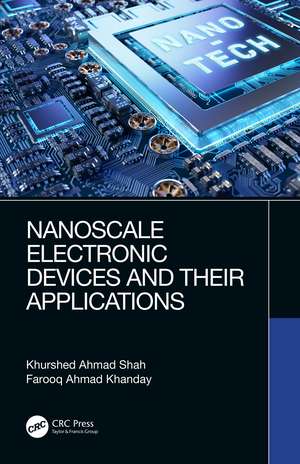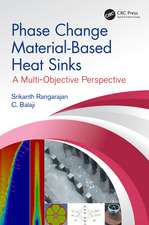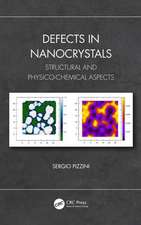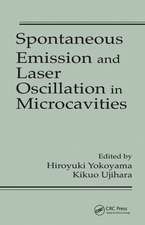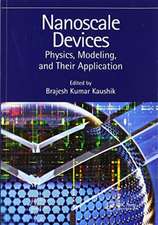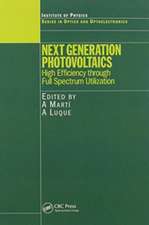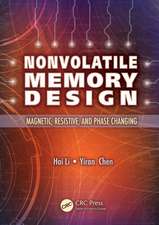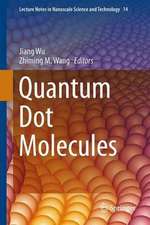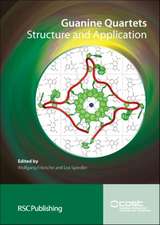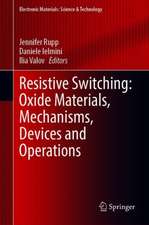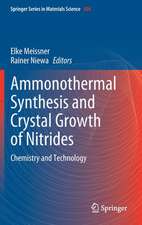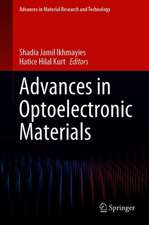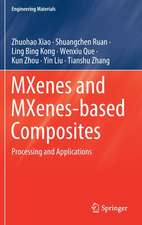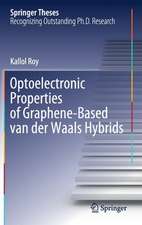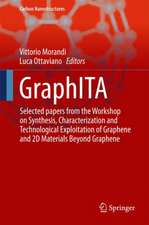Nanoscale Electronic Devices and Their Applications
Autor Khurshed Ahmad Shah, Farooq Ahmad Khandayen Limba Engleză Hardback – 31 iul 2020
- Covers a wide area of nanoscale devices while explaining the fundamental physics in these devices
- Reviews information on CNT two- and three-probe devices, spintronic devices, CNT interconnects, CNT memories, and NDR in CNT FETs
- Discusses spin-controlled devices and their applications, multi-material devices, and gates in addition to phase-change devices
- Includes rigorous mathematical derivations of the semiconductor physics
- Illustrates major concepts thorough discussions and various diagrams
| Toate formatele și edițiile | Preț | Express |
|---|---|---|
| Paperback (1) | 312.43 lei 6-8 săpt. | |
| CRC Press – 25 sep 2023 | 312.43 lei 6-8 săpt. | |
| Hardback (1) | 570.45 lei 6-8 săpt. | |
| CRC Press – 31 iul 2020 | 570.45 lei 6-8 săpt. |
Preț: 570.45 lei
Preț vechi: 671.12 lei
-15% Nou
Puncte Express: 856
Preț estimativ în valută:
109.16€ • 116.73$ • 91.01£
109.16€ • 116.73$ • 91.01£
Carte tipărită la comandă
Livrare economică 17 aprilie-01 mai
Preluare comenzi: 021 569.72.76
Specificații
ISBN-13: 9780367407070
ISBN-10: 0367407078
Pagini: 235
Ilustrații: 22 Tables, black and white; 110 Illustrations, black and white
Dimensiuni: 156 x 234 x 14 mm
Greutate: 0.51 kg
Ediția:1
Editura: CRC Press
Colecția CRC Press
ISBN-10: 0367407078
Pagini: 235
Ilustrații: 22 Tables, black and white; 110 Illustrations, black and white
Dimensiuni: 156 x 234 x 14 mm
Greutate: 0.51 kg
Ediția:1
Editura: CRC Press
Colecția CRC Press
Cuprins
1. Fundamentals of Nanoscale Electronic Devices. 2. Carbon Nanotubes and their Device Applications. 3. Electronic Transport Properties of Doped Carbon Nanotube Devices. 4. Field Effect Transistors Based on Graphene and Other Popular Two Dimensional Materials. 5. Gate and Channel Engineered Nanoscale Electronic Devices. 6. Spin Nanoscale Electronic Devices and their Applications. 7. Phase Change Devices and their Applications.
Notă biografică
Khurshed Ahmad Shah is presently working as Assistant Professor, Department of Physics, S. P. College, Cluster University Srinagar, J&K, India. He did his Doctorate in Physics from Jamia Millia Islamia, Central University, New Delhi, India, and Master of Philosophy through University of Kashmir, Srinagar, India. Dr. Shah has the privilege to work with renowned Scientists Prof. C. N. R Rao in the year 2016, 2017 and 2018. He has co-authored four books and published good number of research papers in National and International peer reviewed journals including Elsevier and Springer journals. Besides has presented his research work in many National and International Conferences. He has successfully handled three National level major research projects as Principal Investigator and under these projects has established two research laboratories. The awards in his name include Indian National Science Academy Visiting Scientist Fellowship 2019-20, J&K State Innovative Science Teacher Award- 2013, Jawahar-Lal Memorial Fellowship for Doctorial Studies-2006 and topped at the National level, Young Scientist Fellowship-2010, besides awarded many prizes in various competitions organized by Department of Science & Technology. Dr. Shah is editorial board member and reviewer of many scientific journals besides he is member of many scientific and academic associations. He has delivered number of extension lectures in the frontier area of Science and Technology- Nanotechnology at state and national level and gave coaching to students for competitive examinations.
Farooq Ahmad Khanday received M. Sc., M. Phil. and Ph.D. Degrees from the University of Kashmir, India in the year 2004, 2010 and 2013 respectively. He joined the Department of Electronics and Instrumentation Technology, University of Kashmir, Srinagar, India as Assistant Professor in May, 2010. His research interest includes Nano-Electronics, Low-voltage Analog integrated circuit design, Fractional-order Circuits Neuromorphic Computing, Stochastic Computing and Biomedical Circuit Design. He is author or co-author of more than 80 publications in peer reviewed indexed International and National journals/conferences of repute and two book chapters. He is the Management Committee (MC) observer of the COST Action CA15225 (Fractional-order Systems) of European Union. Besides, he is the member of several profession societies and serving as a reviewer for many International and National scientific journals in Electronics. He has successfully guided two Ph. D scholars and currently seven Ph. D. scholars are under his supervision. Furthermore, he has completed two research projects as Principal Investigator besides one major research project is ongoing under his guidance to the tune of ~Rs. 54 Lacs funded by SERB-DST, Govt. of India, under EMR scheme.
Farooq Ahmad Khanday received M. Sc., M. Phil. and Ph.D. Degrees from the University of Kashmir, India in the year 2004, 2010 and 2013 respectively. He joined the Department of Electronics and Instrumentation Technology, University of Kashmir, Srinagar, India as Assistant Professor in May, 2010. His research interest includes Nano-Electronics, Low-voltage Analog integrated circuit design, Fractional-order Circuits Neuromorphic Computing, Stochastic Computing and Biomedical Circuit Design. He is author or co-author of more than 80 publications in peer reviewed indexed International and National journals/conferences of repute and two book chapters. He is the Management Committee (MC) observer of the COST Action CA15225 (Fractional-order Systems) of European Union. Besides, he is the member of several profession societies and serving as a reviewer for many International and National scientific journals in Electronics. He has successfully guided two Ph. D scholars and currently seven Ph. D. scholars are under his supervision. Furthermore, he has completed two research projects as Principal Investigator besides one major research project is ongoing under his guidance to the tune of ~Rs. 54 Lacs funded by SERB-DST, Govt. of India, under EMR scheme.
Descriere
This book helps to acquire thorough understanding of the basics of solids at nanoscale besides their applications including operation and properties of recent nanoscale devices covering carbon nanotube devices and their applications, doping techniques, construction and operation details of channel Engineered MOSFETs and spin devices.
